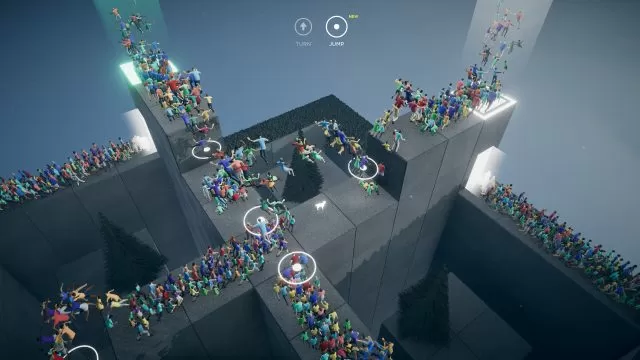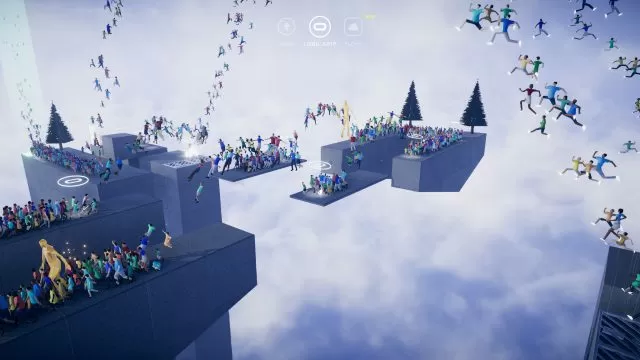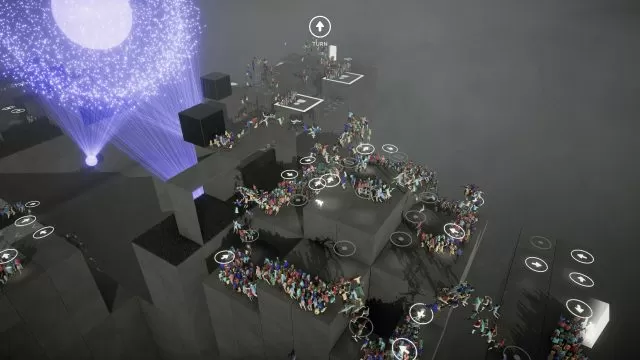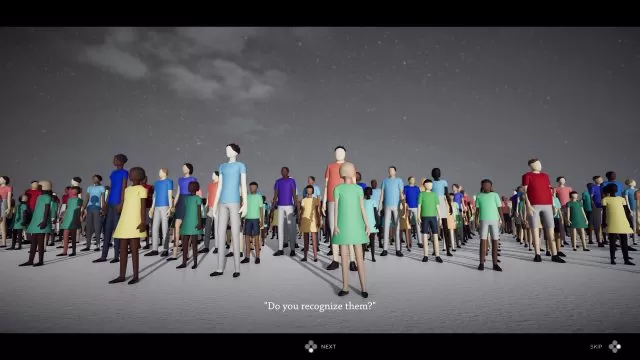Humanity Review – Mind Over Mater
Reading up on Humanity, I was vaguely expecting a simple puzzle game reminiscent of Lemmings 3D. What emerged instead was an arsenal of good ideas incorporating some of Lemmings’ DNA, but building and mutating on top of it in a quite significant way. Humanity offers a unique experience that’s both abstract and concrete if you could reconcile those opposing states inside your mind. This is one of a kind game with a weird vibe that will assure its short to mid-term obscurity. I wouldn’t be surprised that, ten years from now, people would recognize it as a defining puzzle game of the twenties. Far fetched, I know.
In Humanity, you play as a ghostly Shiba Inu dog leading rivers of people through obstacle-ridden levels toward the glowing end square. People behave like lemmings, walking in a straight line unless you bark the desired command and direct the flow. Sounds simple enough, no? It is quite simple, at least in theory, but the escalation of circumstances and features is completely off the scale. During ninety levels of Humanity, you will witness the wonders you couldn’t possibly imagine in its elementary beginnings.
The rapid escalation of ludicrous ideas

Everything, indeed, starts modestly. Your initial tasks would have you direct the people around a few simple bends, making sure they end up on target and not over the cliff. You will accumulate a frightening amount of collateral casualties along the way, but the game makes an early point about rebirth. Their bodies will fall, but will be instantly reborn, the mysterious voice reassures us. Ethereal, pseudo-religious symbolism is prevalent in Humanity, but you’ll need to make a conscious effort to understand the complex allegories. Every bit of an overreaching story is open to interpretation, nothing is presented as a (in your) face value.
Each command you bark remains placed on the environmental square until you cancel or replace it. Pretty soon, you will augment your directional arsenal with jumping. Directing people over the chasms will increase in complexity with the wider gaps and taller platforms, facilitating the use of several sub-variants of jumping. Longer and higher jumps, as commands, often have limited use in the mission, forcing you to experiment and compensate. Then the game will introduce you to floating. And powerful fans built-in the architecture, combined with float-bark turns the river of people into a storm of people. Then the switches will make the appearance, along with the pushable cubes used for their activation. After all that ruckus, you will realize that you barely scratched the surface of all Humanity has to offer.
Unhinged but stress-free experimentation

The best thing about Humanity is the complete lack of pressure in experimentation. You can even keep the inputs from unsuccessful attempts, enabling the tweaking of the command sequence in the follow-up attempts. Some complex levels will tax your mind in a way you hardly thought possible. But the game even has a built-in video solution for every level, with two important caveats. Firstly, watching those will affect your score. Secondly, those videos don’t tackle optional objectives, present at almost every level.
Those optional objectives (which are hardly optional), are Goldies, the Oscar lookalikes. You are supposed to pick up those towering and shiny human figures and bring them safely to the exit square. Goldies work as score stars in mobile games – to unlock the final mission in each chapter, you’ll need to save X number of them. Picking up and delivering a Goldie often massively complicates everything. They also exist as a meta-game success counter, unlocking various cosmetics for the people, the ability to pause the game, change the music, and several other features.
Finally, there are levels in which Goldies are the primary objective. Leading those enthusiastic but brain-dead Oscar mega-clones towards dedicated Goldie exits is often combined with a population limit. In other words, not only you must pick up Goldy and extract it, but you can’t lose any people along the way. Humanity tries and succeeds in keeping you on your toes, as level objectives vary and shift wildly within a single chapter.
Humanity constantly reinventing itself

As I said before, each new section brings something new. Sometimes it’s just a brand-new ability, and more often than not, innovation lies in completely revamped dynamics. In the second chapter, for example, Humanity briefly changes from a real-time, input-oriented puzzle to a pre-planned puzzle strategy game. Instead of directing the flow in real-time, you are asked to plan the entire level ahead – once you bark at the “start” button, you cannot further interact with the flow.
After you familiarize yourself with that, the game reverts to its original mechanics, but brings, for the first time, antagonists. Humanity introduces “others” in its third chapter, describing them as a “group of people you don’t share anything with”. Another allegory, or just intellectual bait? Anyway, Others will interfere with your progress, setting their own flows in motion every time you pick up a Goldy. They will try to intersect their flow with yours to steal it. That, of course, it’s not all. There are many more completely unexpected surprises along the way. Weapons? Boss fights? Reaching the peak of weirdness will take a long time here.
People’s Champion

If you are looking for something clever, beautiful, and unusual, embrace Humanity. The game is modestly priced (30 USD/EUR), and even available for free if you are PlayStation extra subscriber. With a palpable decline in Xbox/PC Game Pass offerings of late, it’s nice to see that Sony is more than able to pick up the ball a run a victory lap. Humanity also supports VR on every platform, and in the case of PlayStation, it works on both generations of headsets. VR mode is entirely optional but provides another chill addendum to a pretty sophisticated package.
As a parting gift, this charming game offers a fully-fledged level editor and a repository for playing levels created by the community. Some of those are definitely not meant for faint-hearted players, but puzzle enthusiasts who fall in love with Humanity will potentially extrapolate infinite fun from it.
Highs
- Innovative 3D puzzler brimming with bright ideas.
- The game constantly surprises the player.
- Subtle but clever allegories all over the place.
Lows
- Some mind-numbingly difficult stages.
- Built-in solution provider is way too tempting.

